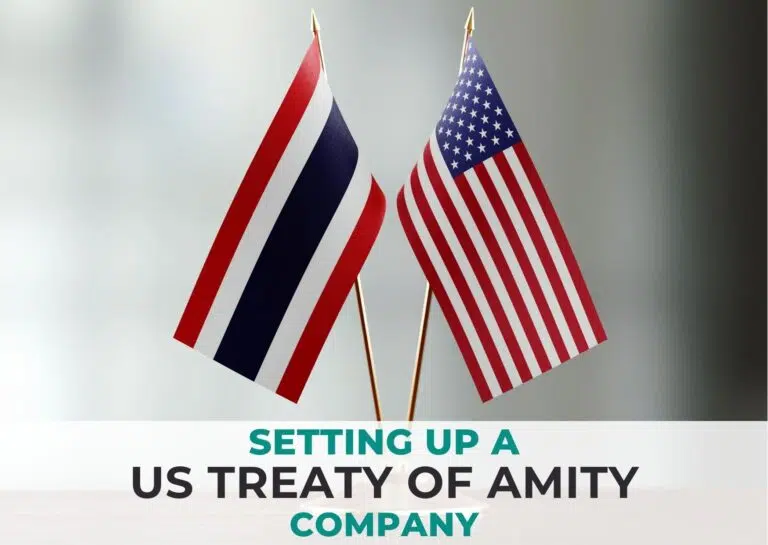Home » Corporate Business » Setting Up a US Treaty of Amity Company in Thailand

Setting up a company in a foreign country can be a complex process, but if you’re a US company looking to do business in Thailand, the Treaty of Amity and Economic Relations between the United States of America and the Kingdom of Thailand can provide favorable conditions and legal protections for your venture. In this guide, we will explore the advantages of setting up a US Treaty of Amity company in Thailand, and the requirements for registration.
An international pact known as the Treaty of Amity was reached between the US and Thailand with the intention of fostering bilateral trade, commerce, cultural understanding, and legal rights. Signed in 1966, this treaty aims to promote economic cooperation and provide favorable conditions for US companies wishing to do business in Thailand.
An ‘Amity Treaty company’ in Thailand refers to a company that has been established under this treaty. Companies founded in accordance with the Treaty of Amity are entitled to a number of benefits and exemptions, including as immunity from asset expropriation and nationalization, access to dispute resolution procedures, and the capacity for 100% foreign ownership without the need for a Thai partner.
If you’re considering setting up a company in Thailand, opting for a US Amity private limited company can offer several advantages:
The Amity and Trade Treaty allows U.S. citizens to have majority ownership in companies participating in certain portions of state-owned enterprises where majority ownership is limited to Thai citizens under the Foreign Business Acts.
It gives a sense of security and stability for US corporations operating in Thailand. These companies are safeguarded against the Thai government’s nationalization and expropriation of their assets. Additionally, in the event of a dispute with the Thai government, Amity companies have access to international dispute resolution mechanisms, such as international arbitration.
Amity companies enjoy certain privileges and exemptions, including tax exemptions and reductions. Hence, it makes it easier and more attractive for them to do business in Thailand.
The Amity and Trade Treaty specifies that companies that are predominantly American owned will be treated as nationals or will be able to act on the same basis as Thai companies. However, there are some exceptions. Amity and trade treaty companies are not allowed to own land or participate in certain state-owned enterprises such as transportation and courier, local trade in agricultural products, land, exploitation of natural resources, taking care of property for the benefit of others, and independent professions such as bank and financial institution that involve with fund deposits.
It is essential to be aware of these restrictions when planning your business activities as a US Amity company.
Amity treaty companies take more time and cost to register than most Thai and foreign non-amity treaty companies. Amity and trade treaties operate under a foreign business license. Therefore, they are usually subject to more scrutiny than Thai majority owned companies.
To register a US Amity limited company in Thailand, you need to fulfill several requirements. Here’s what you’ll need:
The company name must be unique and not used by others.
You will need a local registered business address in Thailand for official correspondence and legal purposes.
You must have at least one registered director for your company. The director can be either Thai or US, depending on your preference and requirements. You must have at least two shareholders, with the majority of shares owned by a US national or a US company with US nationals as shareholders. This ensures compliance with the Treaty of Amity provisions.
For Foreign Business License (FBL) purposes, the capital requirement is at least 3 million Thai Baht. In case that the business is not restricted under the Foreign Business Act, the minimum capital requirement is THB 2 million. It's important to have sufficient capital to support your business operations and meet regulatory requirements.
Obtaining an FBL for a US Amity company normally takes about two months. Make sure that your planned activities comply with the regulations to avoid any legal issues.
Establishing a US Treaty of Amity company in Thailand offers significant advantages for American investors looking to expand in Southeast Asia. The Treaty of Amity allows U.S. citizens and businesses to enjoy majority ownership and operate on equal footing with Thai companies, creating a strong foundation for long-term success.
Setting up an Amity company, however, involves understanding Thailand’s legal requirements and registration procedures. With Magna Carta’s team of experienced legal advisors, you can ensure a smooth setup process that fully complies with Thai business laws.
If you’re planning to start a US Amity company in Thailand, contact Magna Carta today to schedule a consultation and discover the best structure for your business goals.

Magna Carta Law Firm website uses cookies. Further details are set out in our Cookies Statement. Necessary cookies (essential to make our website work) are always on. You can adjust your preferences using the 'View preferences' button in the footer of our website.